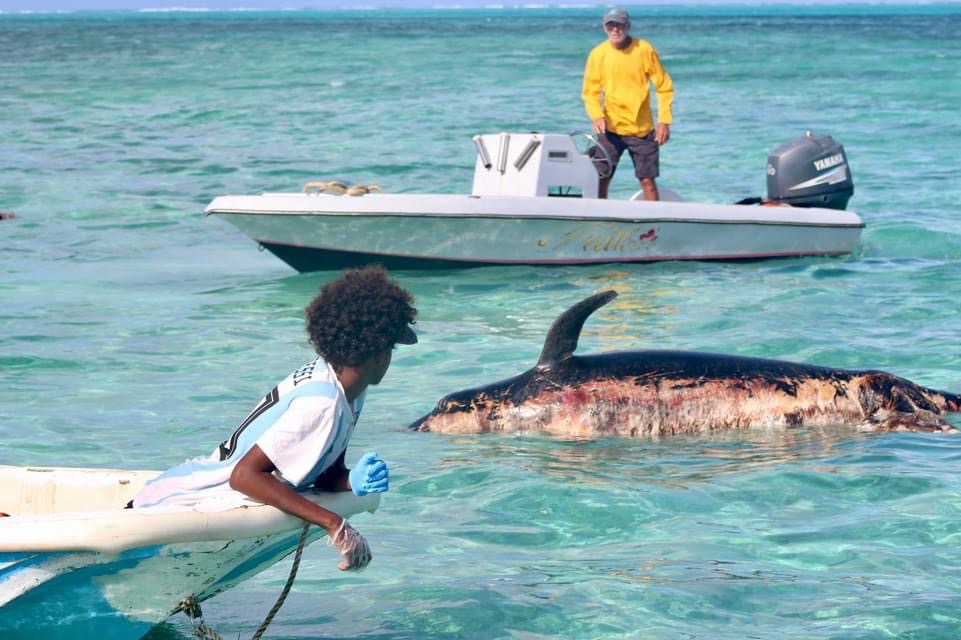Scientists are trying to determine what caused more than 50 shortfin pilot whales to strand on the shores of eastern Anegada on Saturday, where local fishers noticed them caught in shallow waters and dying on the beach.
Though volunteers were able to save at least two of the mammals over the course of several hours, the carcasses of the others have been buried or towed out to sea with help from nonprofit organisations, residents, fishers and government officials.
“It’s horrible to see so many beautiful creatures dead on the beach, but at the same time we don’t really know the cause,” said Kendyl Berna, president of the Virgin Islands-based non-profit Beyond the Reef International. “It could be a natural cause.”
Days earlier, on June 22, five pilot whales were found stranded on the shores of Cape Cod, Massachusetts. The Inter- national Fund for Animal Welfare noted that the area is known to be difficult to navigate, with ever-changing shoals of sand, large tidal fluctuations, and strong currents.
Similar conditions may have affected the whales on Anegada, Ms. Berna said.
The whales were first spotted on Saturday by local fishers, who then contacted people across the territory to notify them about what happened.
“An unfortunate situation today: We counted 46 deceased whales,” resident Rondel Smith wrote on Facebook that day. “Pilot whales are highly social animals that spend their entire lives in a pod, and in the event that an individual gets sick or is in distress the entire group will stay with that member, which sometimes causes the entire group to strand while supporting that individual.”
Gov’t response
The Ministry of Natural Resources and Labour announced on Tuesday that up to 57 whales perished.
“To date, 17 [dead] whales that were found entangled within the prop roots within the mangrove forest and conch mounds were towed out at sea,” the ministry noted in a statement. “The 30 to 40 whales that were beached on the sand were buried.”

Removal of all the whales was expected to finish yesterday. Beyond the Reef arrived at the scene on Sunday along with the Association of Reef Keepers and other community
volunteers.
Government officials decided to remove the carcasses because of their high number and the importance of eastern Anegada and the conch mound for tourism and local fishers, according to Beyond the Reef.
“While we aren’t certain why this happened, what we do know is that they came over the reef and became stuck in the Anegada shallows,” Ms. Berna wrote on Facebook. “We found many dead on the beach. We also found several still alive in two feet of water near the mangroves.”
Videos she posted showed some whales being escorted back out to sea, where they were able to pass the coral heads and get into deeper water.
Local fishers used boats of all sizes to help remove the carcasses from the area, she said.
‘Social species’
NRL Ministry marine biologist Argel Horton urged residents not to attempt to remove living whales from the beach.
“Mass stranding in whales usually occurs in highly social species such as the pilot whales that have been stranded in Anegada over the past few days,” she said in a Sunday press release. “They have a herding instinct, meaning that the entire group will most likely stick together even if one is sick or damaged, ultimately leading to the entire pod to strand while trying to support that one. Even if healthy whales are removed from the beached area, they usually return to the shore as the unhealthy whales will keep calling for help.”
She added that sharks may be in a frenzy to attack.
“Unfortunately, survival rates are very low for beached whales, and the [VI] does not have the captive facilities to nurse giant injured mammals,” she said.
Tissue samples
As the whales were removed, scientists have been collecting tissue samples in hopes of identifying the cause of the mass stranding.
To that end, ARK noted that it is working with specialists from the Puerto Rico Stranding Network and the Caribbean Marine Mammal Conservation Network.
The whales may belong to a pod of more than 150 observed in the area recently, government stated.
Residents were urged to keep an eye out for any more strandings in the territory this week.